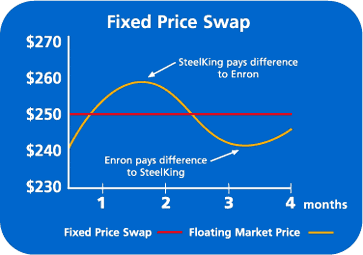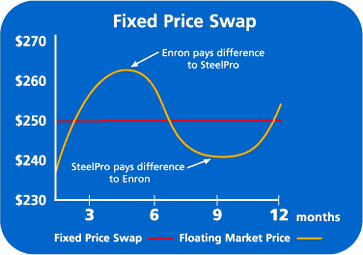 |
Swaps are the most widely used price risk management tool for a variety of reasons, the most common being that there is no upfront transaction cost. They enable companies to maintain their own physical supply relationships while at the same time hedging price risk.
Swaps give companies the ability to effectively switch from one price structure to another - from an index price to a fixed price or vice versa. They are used most often to fix, or lock in, prices received or paid for a commodity. In exchange for price protection, the ability to capitalize on future beneficial price movements is sacrificed.
For example, producers can use swaps to lock in the specific price they will receive for the steel they sell. Conversely, consumers of steel can use swaps to lock in the specific price they will pay for the steel they buy.
The typical swap transaction involves the exchange of a fixed price for a variable price tied to an acceptable market index. Settlement is financial, i.e., cash changes hands; physical product does not. Each month during the life of the transaction, the difference between the fixed and variable price is calculated and payment is made to the appropriate party.
Swap: Producer Application
SteelKing, an integrated producer of steel, is interested in fixing the price of its commercial-grade hot-rolled steel. The company is concerned that market conditions could cause steel prices to decline sharply and squeeze margins to the point of jeopardizing future earnings. To eliminate this threat, SteelKing enters into a swap with Enron that locks in the price of commercial grade hot-rolled steel at $250/short ton on 40,000 tons per month, or 50 percent of monthly production. This transaction ensures that SteelKing will receive a fixed price for 50 percent of its steel regardless of market conditions.
During the Life of the Swap
- SteelKing continues to sell physical steel to customers of its choice, at current market prices.
- On a monthly basis, SteelKing and Enron exchange payments equal to the difference between the fixed price of $250/ton and the prevailing index price.
- For example, if the index price is $240/short ton in a given month, SteelKing will receive from Enron $10/short ton on 40,000 tons. However, if the index price is $260/short ton, SteelKing will pay $10/short ton to Enron.
- SteelKing has stabilized a portion of its operating revenue with the swap, giving the company the ability to achieve a key performance target.

Swap: Consumer Application
SteelPro, a steel service center, is preparing its annual price catalog. About half of the company's customer base demands the ability to buy the products at the listed catalog price for the entire year, regardless of hot-rolled steel prices. This makes it impossible for SteelPro to pass on hot-rolled steel price increases no matter what the magnitude. On the other hand, customers don't necessarily expect lower prices if steel prices should fall - they simply want a fixed price they can count on. To service its customers while protecting its margins, SteelPro enters into a one-year swap, which effectively fixes the price of hot-rolled steel at $250/short ton on a monthly volume of 20,000 tons, or 50 percent of anticipated monthly catalog sales.
During the Life of the Swap
- SteelPro continues to purchase hot-rolled steel from the supplier(s) of its choice at current market prices.
- On a monthly basis, Enron pays SteelPro the index price and SteelPro pays Enron the fixed price of $250. They exchange
payments equal to the difference between the fixed price of $250/short ton and the index price for hot-rolled steel.
- For example, if the index price for hot-rolled steel is $260/ton in a given month, SteelPro will receive from Enron $10/short ton on 20,000 tons. However, if the index price is $240/short ton, SteelPro will pay $10/short ton to Enron.
- The net effect of combining the swap cash flows with actual purchases of hot-rolled steel is a fixed price of $250/ton.
- The swap enables SteelPro to publish and stand behind its listed prices with full confidence that the margin on those sales is protected from fluctuating steel prices.

on to Caps and Floors
back to Products and Services

top of page

|





